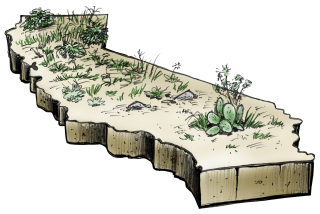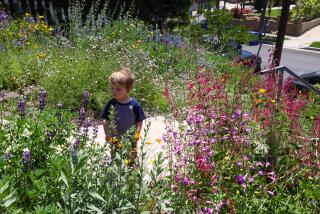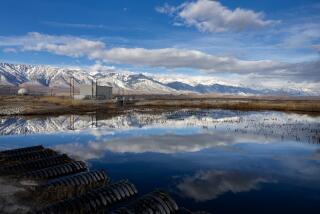Sprinkling of good news
Los Angeles residents were told to cut their water use this summer, and they did: Consumption in June hit a 32-year low. Local rainfall continues to lag behind normal levels, the Sierra snowpack remains light and allocation cutbacks from the Metropolitan Water District are still in effect, so this is no time to start washing down the driveway. But the point is that, when Angelenos needed to quickly and drastically conserve, they came through.
Was it because the Department of Water and Power unleashed a snitch campaign encouraging neighbors to turn each other in for running their sprinklers on some day other than Mondays and Thursdays? Probably not. Was it because of roving DWP enforcement patrols? They issued citations, but to just a small fraction of the populace. Was it because of a tough new rate structure that rewards conservation and penalizes waste? Perhaps, although many ratepayers haven’t seen the full impact of the structure because the summer is still young and not all the bills have arrived in the mailbox.
Let’s consider the very real possibility that Los Angeles residents saved water because they take the drought seriously. They have a high degree of environmental awareness. They want to conserve -- even if that means their lawns may turn brown.
Those browning lawns may not be pretty, but they are in part a badge of residents’ environmental stewardship. Yet Councilman Greig Smith saw something incongruous about dying grass in a supposedly greening L.A., and he’s seeking an adjustment that would let residents water their lawns for eight minutes a day, three days a week, instead of the currently allowed 15 minutes a day, twice a week.
Credit Smith for seeking balance while actually stepping up the conservation regimen. But keeping the grass green should not be a long-term goal for the city. The DWP is partly paying homeowners to rip out their thirsty lawns and replace them with drought-tolerant landscapes. The city should offer more incentives to kick the lawn habit instead of trying to keep them green.
Smith’s proposal likely wouldn’t do much good for lawns anyway. Gardening experts say it’s better for a perennial (like lawn grass) to be watered longer, deeper and less often. Besides, by the time the recommendation gets past the Board of Water and Power Commissioners and to the council floor, the dry season will probably be over and lower winter rates will be in effect. The city will learn as it goes, and can adjust its habits when necessary, but the current rules are working. It’s not time to throw them out.
More to Read
Sign up for Essential California
The most important California stories and recommendations in your inbox every morning.
You may occasionally receive promotional content from the Los Angeles Times.










